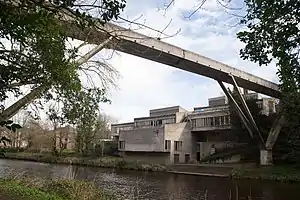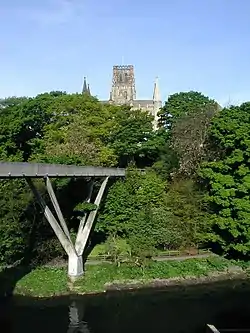Kingsgate Bridge
Kingsgate Bridge is a striking, modern reinforced concrete construction footbridge across the River Wear, in Durham, England. It is a Grade I listed building.[1] It was personally designed in 1963 by Ove Arup,[1] the last structure he ever designed.[2] Kingsgate Bridge connects Bow Lane on the historic peninsula in the centre of Durham to Dunelm House on New Elvet (to which building Arup's studio also contributed), and opened in 1966. Kingsgate Bridge is thought to have been one of Arup's favourite designs of all, he having spent many hours working on every detail of the plans.[3]
Kingsgate Bridge | |
|---|---|
 Kingsgate bridge in front of Dunelm House | |
| Coordinates | 54.7731°N 1.5726°W |
| OS grid reference | NZ275421 |
| Carries | Pedestrians |
| Crosses | River Wear |
| Locale | Co. Durham |
| Owner | Durham University |
| Heritage status | Grade I listed |
| Preceded by | Elvet Bridge |
| Followed by | Prebends Bridge |
| Characteristics | |
| Material | Reinforced concrete |
| Longest span | 106.7 m (350 ft) |
| History | |
| Architect | Ove Arup |
| Designer | Ove Arup |
| Engineering design by | Ove Arup & Partners |
| Construction end | 1963 |
| Location | |
Its construction was unusual. The two halves were each built parallel to the river, then rotated through 90° to make the crossing.[4] The meeting point of the two halves is marked by a simple bronze expansion joint using a linear gear bearing.[5][6]
In 1965, the bridge was the winner of the Civic Trust Award.[7]
In 1993, it won Certificate of Outstanding Performance (Mature Structures Category) of the Concrete Society.[8]
A bust of Arup, cast in resin, was installed on the side of Dunelm House, the students' union building adjacent to the bridge, in September 2011. The sculpture is a copy of a 1987 bust by Diana Brandenburger, held by the National Portrait Gallery.[9][10] It is a replacement for a previous copy of the same bust, in bronze, which was unveiled by Karin Perry, Arup's daughter, on 16 April 2003, the 108th anniversary of Arup's birth, but which was stolen from its plinth during the summer of 2006.[11]
In February 1998, the Durham Union Society president, Tom Joyce, fell through the bridge, but caught himself and was uninjured. This event was described in the Palatinate as ‘an Indiana Jones style adventure’ with Mr Joyce himself being quoted with the immortal words ‘there was no time to fear’.
During a university RAG Week in the late 1960s students suspended a car beneath the bridge.[12]
Gallery
 Kingsgate Bridge view from deck
Kingsgate Bridge view from deck Kingsgate Bridge seen from Durham Students' Union, the Cathedral above
Kingsgate Bridge seen from Durham Students' Union, the Cathedral above
References
- Historic England. "Details from listed building database (1119766)". National Heritage List for England. Retrieved 30 June 2006.
- Steele, Matthew (12 November 2020). "Concrete jungle: The brutalist buildings of northern England – in pictures". The Guardian.
- "Plaque Commemorates Birth Place of Sir Ove Arup - Engineer and Philosopher". Arup. 15 June 2000. Archived from the original on 22 April 2004.
- Rennsion, Robert William; Barbey, M.F. (1996). Civil engineering heritage. Thomas Telford. ISBN 978-0-7277-2518-9.
- "Kingsgate bridge". Arup. Archived from the original on 21 May 2010.
- "Durham Bridges: 1. Kingsgate Bridge". The Happy Pontist. 28 November 2013.
- "Sir Ove Arup and Durham". www.durhamcity.org. Retrieved 23 February 2013.
- "Kingsgate Bridge: Work Suspended". www.durham21.co.uk. Retrieved 23 February 2013.
- "World-renowned engineer Sir Ove Arup honoured with unveiling of new bust". Durham University. 28 September 2011. Archived from the original on 22 August 2014.
- NPG 5968; Sir Ove Arup
- Statue thieves Arup to no good, The Northern Echo, 6 November 2006
- "Image of car suspended beneath the bridge". Archived from the original on 4 June 2011.